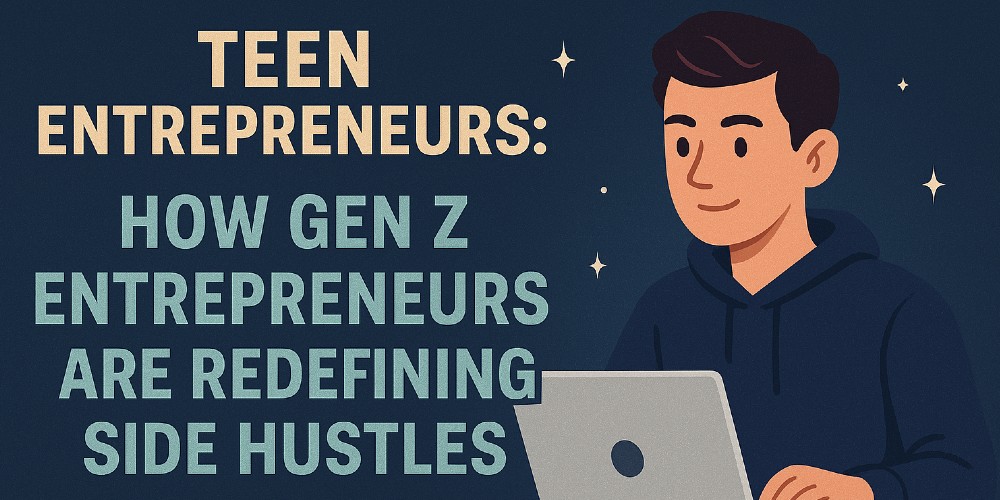Gen Z entrepreneurs — those born roughly between 1997 and 2012—are transforming side hustles by harnessing digital tools, creativity, and innovative online platforms. From content creation and influencer marketing to e-commerce and remote freelance gigs, they’re reshaping entrepreneurship, driving trends, and creating lucrative income streams at unprecedented rates.
The Rise of Gen Z Entrepreneurs
Generation Z, known for their digital-native status, are quickly becoming the most entrepreneurial generation yet. Approximately 40% of Gen Z teens are already making money online, driven by digital literacy and the desire for financial independence. Platforms such as TikTok, YouTube, and Shopify have opened unprecedented opportunities for young people to monetize their skills and passions.
The rise of Gen Z entrepreneurship is not just driven by technology but also a cultural shift towards valuing independence, flexibility, and creativity. Unlike previous generations, Gen Z prioritizes personal fulfillment and meaningful work, often seeking ways to align their passions with their income-generating activities.

Unique Ways Entrepreneurs Innovate
Digital Content Creation
Gen Z thrives on social media platforms, turning content creation into a profitable venture. Teens have built substantial followings on TikTok, Instagram, and YouTube, generating revenue through brand sponsorships, ad revenue, affiliate marketing, and even merchandise sales. Gen Z entrepreneurs excel at understanding and leveraging viral trends, engaging deeply with niche communities, and building personal brands that resonate authentically with their audiences.
E-commerce & Dropshipping
Dropshipping has become a popular side hustle for Gen Z entrepreneurs due to low startup costs and scalability. Platforms like Shopify allow them to quickly launch online stores without needing physical inventory. Niches such as fashion, beauty products, gaming gear, and sustainable goods are particularly lucrative. Gen Z entrepreneurs capitalize on their understanding of social media marketing, influencer partnerships, and digital advertising to rapidly scale their e-commerce ventures.
Remote Gig Economy Jobs
Freelance work appeals strongly to Gen Z because of its flexibility. Sites like Fiverr, Upwork, and Freelancer allow them to offer services ranging from graphic design to social media management. Young freelancers leverage their native digital fluency to stand out in these highly competitive online marketplaces. The gig economy provides Gen Z entrepreneurs with the opportunity to develop professional skills, build extensive portfolios, and establish early careers while maintaining control over their schedules.

Case Studies: Inspiring Gen Z Entrepreneurs
Charli D’Amelio (Digital Content Creator)
Charli D’Amelio gained popularity on TikTok and transformed her dancing videos into a multimillion-dollar brand, including sponsorship deals, merchandise lines, and her own media ventures. Her success illustrates how digital content creation can rapidly scale into significant business opportunities.
Cory Nieves (E-commerce Founder)
At just six years old, Cory Nieves started “Mr. Cory’s Cookies,” an online cookie business that now grosses hundreds of thousands annually. Cory leveraged social media marketing and strategic partnerships to expand rapidly. His story emphasizes how Gen Z entrepreneurs can effectively blend passion and business acumen at an early age.
Isabella Dymalovski (Young Entrepreneur & Beauty Brand Owner)
Founder of Luv Ur Skin, Isabella successfully turned her passion for skincare into a profitable global business by leveraging e-commerce platforms and savvy digital marketing. Her journey highlights how dedication, strategic branding, and leveraging digital platforms can drive international business success for young entrepreneurs.
Tools and Platforms Fueling Gen Z Entrepreneurship
Social media platforms like Instagram, TikTok, and YouTube provide powerful marketing tools. E-commerce platforms such as Shopify and Etsy simplify launching online businesses. Educational platforms like Udemy and YouTube tutorials empower teens with entrepreneurial skills, while communities on Discord and Reddit offer valuable networking opportunities.
How You Can Become a Successful Gen Z Entrepreneur
Starting your entrepreneurial journey as a Gen Z entrepreneur can be accessible:
- Identify Your Passion: Choose a niche you’re genuinely interested in.
- Build a Digital Presence: Use platforms like Instagram, TikTok, or YouTube to create and distribute content consistently.
- Monetize Strategically: Explore options like affiliate marketing, sponsored content, or selling digital products.
- Educate Yourself: Leverage free resources like YouTube or affordable courses on Udemy to enhance your skills.
- Network and Collaborate: Engage with online communities to grow your reach and opportunities.
Frequently Asked Questions (FAQ)
Who are Gen Z entrepreneurs? Gen Z entrepreneurs are individuals born roughly between 1997 and 2012 who launch and operate businesses or side hustles, often leveraging digital platforms such as social media, e-commerce sites, and freelancing services.
How can Gen Z entrepreneurs make money online? Gen Z entrepreneurs typically earn income online through content creation, influencer marketing, e-commerce businesses like dropshipping, selling digital products, affiliate marketing, and freelance gigs.
What challenges do Gen Z entrepreneurs commonly face? Common challenges include balancing school and entrepreneurial responsibilities, limited startup funding, establishing credibility, and effectively managing time and resources.
Which platforms do Gen Z entrepreneurs prefer for side hustles? Popular platforms include TikTok, Instagram, Shopify, Etsy, YouTube, Fiverr, and Discord.
Is starting a side hustle expensive? Not necessarily. Many Gen Z entrepreneurs successfully start side hustles with minimal initial investment, utilizing free or low-cost digital tools, social media platforms, and scalable business models.
Conclusion
These entrepreneurs are reshaping the landscape of side hustles, driven by innovation, digital platforms, and creative strategies. Their success stories demonstrate that entrepreneurship is increasingly accessible to young people who are digitally savvy and creatively inclined. The future of side hustles clearly lies in the hands of this innovative generation, offering exciting opportunities for anyone willing to embrace their entrepreneurial spirit.





















